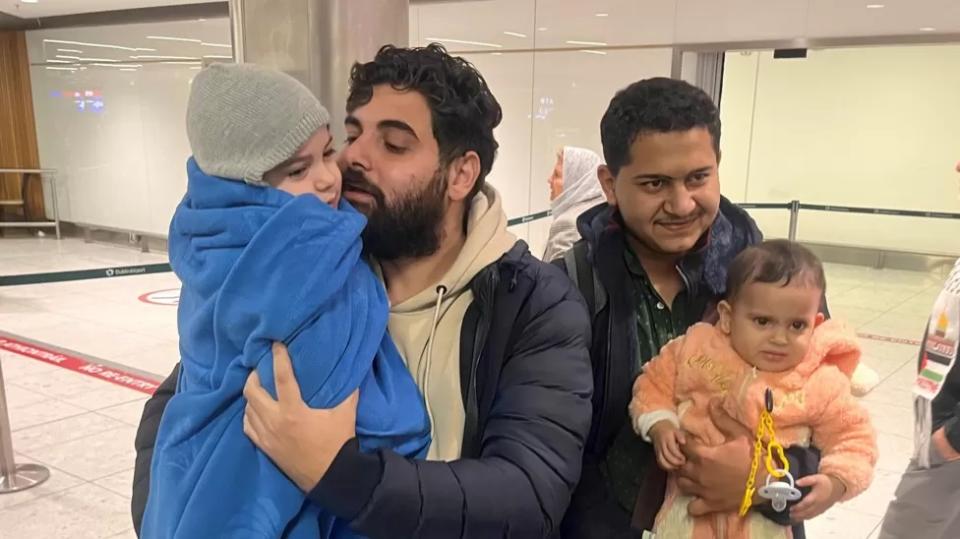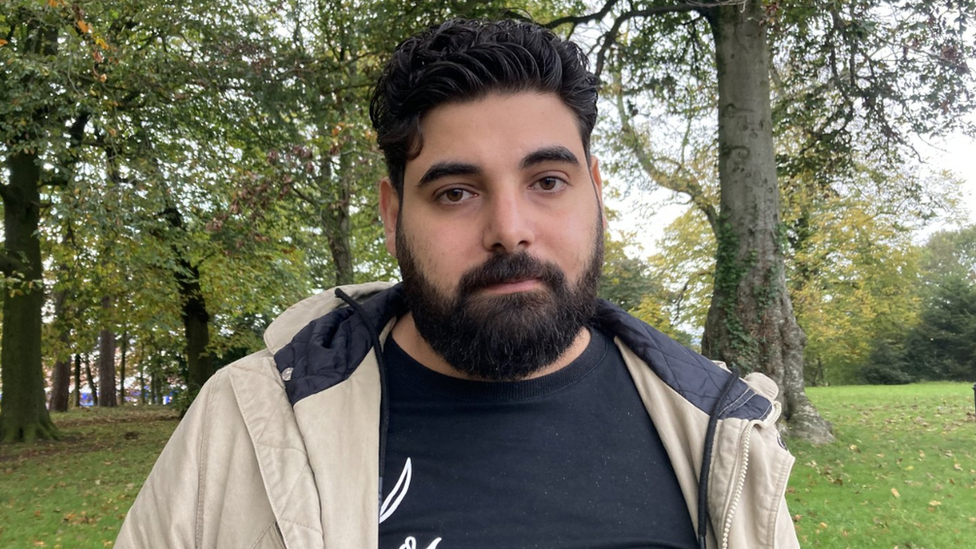“We do fasting during Ramadan, now they’re not fasting, they’re starving, they’re dying.”
A Belfast-born man whose wife and other family members were killed in Gaza has said he cannot celebrate one of the holiest months in the Islamic calendar.
Khalid El-Estal was reunited with his two children after they fled Gaza in November.
He said the situation is “desperate” for his father, two brothers and friends who remain in the territory.
“It is getting worse, every day is worse than the day before it,” he told BBC News NI’s Good Morning Ulster.
“It’s unbelievable what’s happening, everyone’s desperate, everyone’s begging… They feel like I can change everything, everyone is calling me wanting to take them out of Gaza.”
Israel’s military launched an air and ground campaign in the Gaza Strip after Hamas’s attacks on Israel on 7 October, in which about 1,200 people were killed and 253 others were taken hostage.
More than 30,900 people have been killed in Gaza since then, the territory’s Hamas-run health ministry says.
The conflict has created a growing humanitarian crisis, and the UN has warned that famine in Gaza is “almost inevitable”, with an estimated 300,000 Palestinians living there with little food or clean water.
‘It’s totally different’
Mr El-Estal has said he cannot contemplate celebrating Ramadan this year while the war continues in Gaza.
“It’s the most important thing… It’s like Christmas,” he explained. “It’s normally very special days for us but now it’s totally different with what’s happening in Gaza.”
In normal circumstances, Mr El-Estal would have spent the day before Ramadan shopping with his wife and decorating his home with lights.
This year, he did not leave the house.
“I can’t think about doing anything now, it will be like normal days. It’s very painful when you think about what’s happening,” he said.
What is Ramadan?
Ramadan is the Arabic name for the ninth month in the Islamic calendar. It falls on a different date every year, because of the cycles of the moon.
In 2024, Ramadan started on Monday 11 March.
It is considered one of the holiest months for Muslims and is marked by a period of fasting, which is one of the Five Pillars of Islam.
These are five principles which Muslims believe are compulsory acts ordered by God: the other pillars are faith, prayer, charity and making the pilgrimage to the holy city of Mecca.
Muslims believe that some of the first verses of the Islamic holy book, the Qu’ran, were revealed to the Prophet Muhammad during the month of Ramadan.
Extra emphasis is therefore placed on reciting the Qu’ran at this time.
Muslims are also encouraged to give to charity, strengthen their relationship with God, and show kindness and patience.
Born in Belfast, Mr El-Estal attended primary school in the Botanic area while his father worked as a lecturer at Queen’s University.
When he was aged eight, the family relocated to Gaza, where he met his wife Ashwak at university.
He was working in Saudi Arabia when his wife was killed and he appealed for help to be reunited with his four-year-old son Ali and one-year-old daughter Sara.
The children left Gaza via Egypt in November with assistance from the Irish government.
‘Everyday is a struggle’
Mr El-Estal said the children, who are living with him in Dublin, are “getting better every day” after arriving “traumatised”.
His son, Ali, has started pre-school and is beginning to learn English.
“They are the reason I’m doing everything now,” he said.

“It was Mother’s Day yesterday. Every day is a struggle, during the day you’re living a good life, you’re not thinking, but at night you’re thinking all the time about everything, about your family, about what’s happened with my wife,” Mr El-Estal continued.
He said he feels “pressured” when he talks to family and friends remaining in Gaza as he is helpless to their situation.
“I think about everyone,” he added. “I’m thinking about these people. Sometimes you just sleep all the day to forget, to ignore what’s happening.”


